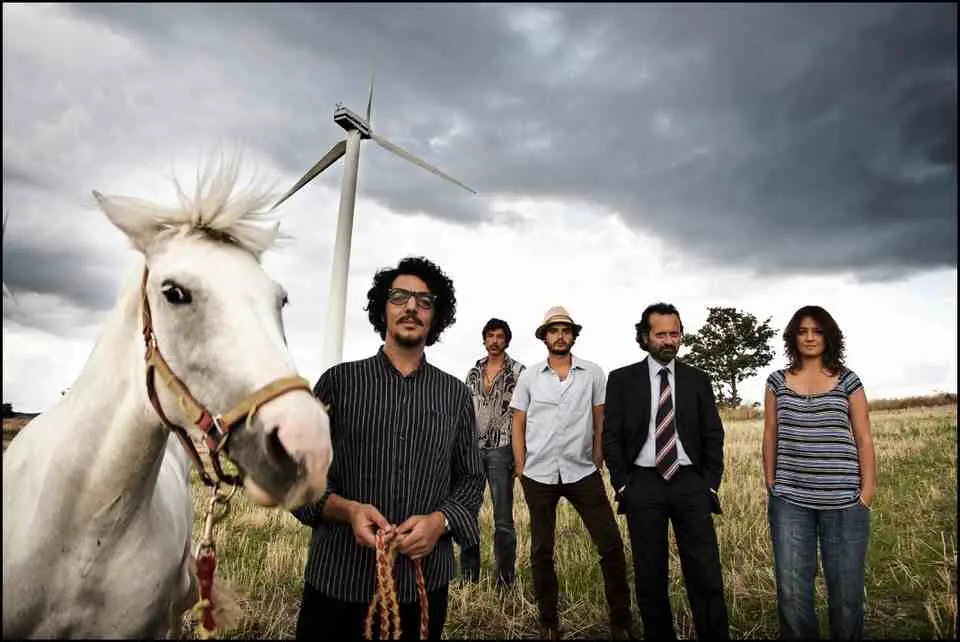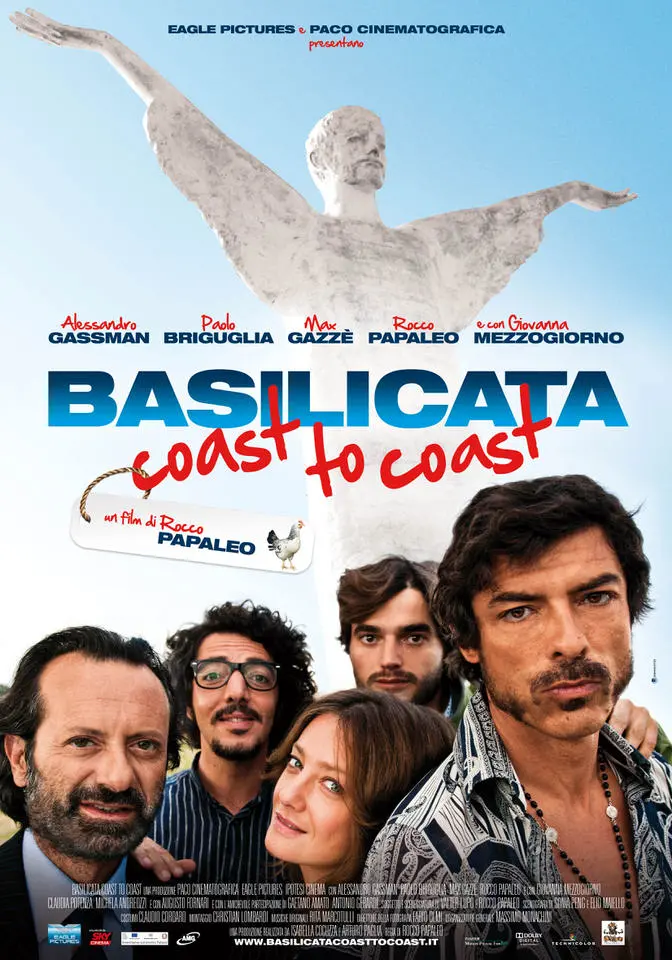
We use cookies
We use cookies and other tracking technologies to improve your browsing experience on our website, to show you personalized content and targeted ads, to analyze our website traffic, and to understand where our visitors are coming from.

“Basilicata exists. It’s a bit like God, you either believe or you don’t”
Rocco Papaleo aka Nicola Palmieri
The film opens with a close-up shot of the Statue of Christ the Redeemer, built in 1965, which is the same size and shape of the statue in Rio de Janeiro. It is located on the top of San Biagio Mountain, in front of the Sanctuary of San Biagio, next to the ruins of an ancient castle. Opposite is a picturesque view over the Gulf of Policastro.
The journey from Maratea to Scanzano Jonico, which the group from the land of wind turbines decides to undertake on foot, is just over 120km long: that’s just under two hours by car, and 10 days on foot following the 233km trail crossing villages, mountains, country roads and valleys chosen by Papaleo and his companions. An itinerary in discovery of a Basilicata off the track beaten by everyday tourism.
They set off in a cart from the centre of Maratea (PZ) on the Tyrrhenian sea, known as the town of 44 churches, for Trecchina (PZ) and then Lauria (PZ), the hometown of Nicola, which was founded in 400 BC by a colony of Cretans. Here the wayfaring musicians are happened upon by their sceptical companion, journalist Tropea Limongi, while they shower naked in the open near the old station of Lauria on the abandoned Lagonegro-Spezzano Albanese railway line (which follows state highway n° 19). Lauria, as explained by Salvatore, is famous for its water: the water used for the musicians’ shower is collected by Nicola and Salvatore from the Fiumicello river, in the contrada of Santa Maria.
Not far away is the flyover where Tropea sings the song she wrote for Franco a few scenes previously.
Step by step, passing through Moliterno (PZ), they come to Tramutola (PZ), the name of which comes from the Latin terra motola, which means rich in water. Here they meet the ‘most beautiful girls in the region’, and all of them, according to Salvatore, have their eyes on Rocco as they walk down Via Vittorio Emanuele.
At one point, the group stops off at the dam on Lake Pertusillo in the municipality of Grumento Nova (PZ), where Franco shows off his fishing skills.
In Aliano (MT), the group pays tribute to Carlo Levi on the terrace of the house he lived in during his exile, and to Gian Maria Volonté, who played the writer in the film based on his masterpiece inspired by these surroundings: Christ Stopped at Eboli. In the background is a picturesque valley. Located on a clay-rich outcrop, the town is the most representative example of a landscape characterised by gullies and wrinkle-like ruts caused by the erosion of the clay by rain. The surrounding landscape, which is full of olive, peach and citrus fruit trees, is known as the ‘Garden of Aliano’.
As the group heads towards the Ionian coast, they come to Craco (MT), which became a ghost town in 1963 when it was hit by a landslide ‘following the construction of the sewer system’, as Nicola explains to Tropea’s camera.
In the meantime, Rocco, who abandoned the group a few scenes previously, is near Viggiano (PZ), paying tribute to the cult of the Black Madonna of the Sacred Mount, the protector of Basilicata.From Craco the group begins their descent down to the Ionian coast: before they arrive at
eir destination, Scanzano Jonico (MT), they stop off in two more places: Tursi (MT), a small town of Medieval origin, and Policoro (MT), which was born from the ruins of the ancient city of Siris-Heraclea, where the first battles were pitched between the Romans and the army led by Pirro in 280 BC.
It’s a shame that the town isn’t located on the coast, “you’d think Scanzano Jonico was on the coast, otherwise it would be called Scanzano al Monte”.
“Basilicata exists. It’s a bit like God, you either believe or you don’t”
Rocco Papaleo aka Nicola Palmieri
The film opens with a close-up shot of the Statue of Christ the Redeemer, built in 1965, which is the same size and shape of the statue in Rio de Janeiro. It is located on the top of San Biagio Mountain, in front of the Sanctuary of San Biagio, next to the ruins of an ancient castle. Opposite is a picturesque view over the Gulf of Policastro.
The journey from Maratea to Scanzano Jonico, which the group from the land of wind turbines decides to undertake on foot, is just over 120km long: that’s just under two hours by car, and 10 days on foot following the 233km trail crossing villages, mountains, country roads and valleys chosen by Papaleo and his companions. An itinerary in discovery of a Basilicata off the track beaten by everyday tourism.
They set off in a cart from the centre of Maratea (PZ) on the Tyrrhenian sea, known as the town of 44 churches, for Trecchina (PZ) and then Lauria (PZ), the hometown of Nicola, which was founded in 400 BC by a colony of Cretans. Here the wayfaring musicians are happened upon by their sceptical companion, journalist Tropea Limongi, while they shower naked in the open near the old station of Lauria on the abandoned Lagonegro-Spezzano Albanese railway line (which follows state highway n° 19). Lauria, as explained by Salvatore, is famous for its water: the water used for the musicians’ shower is collected by Nicola and Salvatore from the Fiumicello river, in the contrada of Santa Maria.
Not far away is the flyover where Tropea sings the song she wrote for Franco a few scenes previously.
Step by step, passing through Moliterno (PZ), they come to Tramutola (PZ), the name of which comes from the Latin terra motola, which means rich in water. Here they meet the ‘most beautiful girls in the region’, and all of them, according to Salvatore, have their eyes on Rocco as they walk down Via Vittorio Emanuele.
At one point, the group stops off at the dam on Lake Pertusillo in the municipality of Grumento Nova (PZ), where Franco shows off his fishing skills.
In Aliano (MT), the group pays tribute to Carlo Levi on the terrace of the house he lived in during his exile, and to Gian Maria Volonté, who played the writer in the film based on his masterpiece inspired by these surroundings: Christ Stopped at Eboli. In the background is a picturesque valley. Located on a clay-rich outcrop, the town is the most representative example of a landscape characterised by gullies and wrinkle-like ruts caused by the erosion of the clay by rain. The surrounding landscape, which is full of olive, peach and citrus fruit trees, is known as the ‘Garden of Aliano’.
As the group heads towards the Ionian coast, they come to Craco (MT), which became a ghost town in 1963 when it was hit by a landslide ‘following the construction of the sewer system’, as Nicola explains to Tropea’s camera.
In the meantime, Rocco, who abandoned the group a few scenes previously, is near Viggiano (PZ), paying tribute to the cult of the Black Madonna of the Sacred Mount, the protector of Basilicata.From Craco the group begins their descent down to the Ionian coast: before they arrive at
eir destination, Scanzano Jonico (MT), they stop off in two more places: Tursi (MT), a small town of Medieval origin, and Policoro (MT), which was born from the ruins of the ancient city of Siris-Heraclea, where the first battles were pitched between the Romans and the army led by Pirro in 280 BC.
It’s a shame that the town isn’t located on the coast, “you’d think Scanzano Jonico was on the coast, otherwise it would be called Scanzano al Monte”.
As well as showcasing the beauty of the landscape and the timeless small towns of Basilicata, the film pays tribute to local food and wine. When the group stops off at the dam on Lake Pertusillo, Salvatore can’t resist the temptation of gnumaridd, roulades of sheep offal traditionally made in Italy’s southern regions.
In Aliano, on the terrace of the house Carlo Levi lived in, the group stops to toast the writer with a bottle of Aglianico del Vulture, a DOC wine produced in the Vulture area, in the province of Potenza.

A group of bizarre musicians crosses Basilicata on foot, from the Tyrrhenian to the Ionian Sea, to participate in the Teatro-canzone Festival of Scansano Jonico.